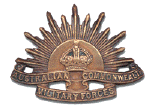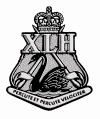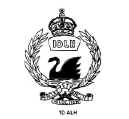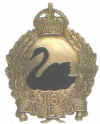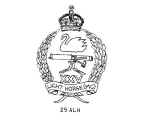|
The first of the mounted
units in Western Australia to be officially formed was the Pinjarra
Mounted Volunteers raised in October 1862. Other volunteer units
followed between 1870 and 1897 under such titles as Union Troop of
Western Australian Mounted Volunteers, The Wellington Mounted Volunteers
and The Perth Mounted Rifle Volunteers. However these were short lived
and by 1897 all had been disbanded.
On 7th June, 1900 orders were given to raise the Western Australian
Mounted Infantry. By 1901 this was completed and it is in this Volunteer
Cavalry Regiment that A Sqn 10th Light Horse Regiment has its origin.
During the South African War 1899-1902 the colony of Western Australia
raised and sent nine contingents (six Western Australian Mounted
Infantry and three Australian Commonwealth Horse).
It is in recognition of services of members of the Volunteer Regiment,
the Western Australian Mounted Infantry, that the Militia Light Horse
Regiment was formed (later the 10th Light Horse Regiment) and was
granted the battle honour ‘South Africa 1900-02’.

Shoulder patch, 10 ALHR
|
In 1903 with the Commonwealth Government controlling Australia’s
defence, the 18th Australian Light Horse Regiment (Western Australian
Mounted Infantry) was formed.
|
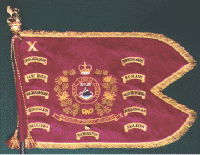
Guidon of 10th
Light Horse Regt
|
With the establishing of Military Districts throughout the Commonwealth
a new system of designation was introduced and in 1912 the 18th A.L.H.
(W.A.M.I.)
became the 25th Light Horse (W.A.M.I.).
At the outbreak of the Great War in 1914 the Australian Imperial Force
(A.I.F.) was raised. Initially a mounted unit was not required from
Western Australia however approval was given for C Squadron of the 7th
Light Horse Regiment to be formed in Western Australia (the balance from
Qld and N.S.W.). Interest was so great that it was realised that a
complete Regiment could be formed by West Australians and the 10th Light
Horse Regiment was established.
The Regiment first saw action on Gallipoli Peninsula as Infantry; their
baptism of fire being at Quinn’s Post and Pope’s Hill. As part of
the 3rd Light Horse Brigade the Regiment, together with the 8th Light
Horse Regiment, was involved in the action of THE NEK where both units
showed outstanding gallantry but suffered severely.
The only Victoria Cross gained by an Australian Light Horse unit in the
First World War was won on Gallipoli by 2Lt H.V.H. Throssell of 10th
Light Horse at Hill 60 on 29/30 August, 1915.
Following the evacuation from the Peninsula, 10th Light Horse saw much
fighting throughout the campaigns in Sinai, Palestine, Jordan and Syria.
In the long advance which was to eventually terminate with the fall of
Damascus, 10th Light Horse had the honour of leading the Australian
Mounted Division. The Regiment accepted the formal surrender of Damascus
on 1st October, 1918.
Before returning home after the Armistice, 10th Light Horse was involved
in quelling the bitter Egyptian uprising of 1919.
On arrival in Australia 10th Light Horse Regiment A.I.F. was disbanded
in 1919. However to perpetuate the traditions and distinctions gained by
the A.I.F. in the Great War it was decided to redesignate the Citizen
Force Units to confirm with the numbers of the A.I.F., therefore (with
the effect from October 1918) 25th Light Horse
(W.A.M.I.) became 10th Light Horse.
On the 10th May, 1928 the Regiment was officially presented with its
Guidon with Battle Honours from the South African and Great Wars. In
1936 10th Light Horse gained affiliation to the 10th Royal Hussars.
During the Second World War in 1940 with one Squadron mechanised, the
title changed to 10th Reconnaissance Battalion (W.A.M.I.). By 1942 the
title was once again changed to 10th L.H. Regiment (W.A.M.I.) with yet
another change to 10th Australian Light Horse Regiment occurring in the
same year. In 1943 the unit gained A.I.F. status however did not serve
overseas.
In 1949 10th W.A.M.I. was formed and equipped with Staghound Armoured
Cars and Canadian Scout Cars. In 1956 the title 10th Light Horse was
again adopted and by this stage was equipped with Staghound Armoured
Cars, Ferret Scout Cars, White and Saracen APCs.
A new Guidon was presented during a mounted parade in 1966 by the then
Governor of Western Australia, Sir Douglas Kendrew.
In 1969 10th Light Horse was re-equipped with the M113A1 family of
vehicles and continues with these to the present time.
In 1976 10th Light Horse became A Sqn 10th Light Horse Regiment.
Miscellaneous Information
Unit Motto - ‘Percute et Percute Velocitor’
(Strike and Strike Swiftly)
Regimental March - ‘Marching through Georgia’
|
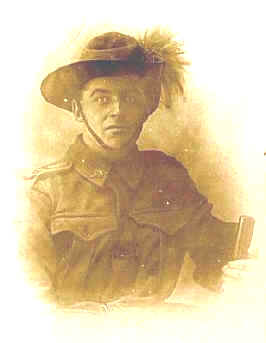 |
|
981 Sgt. T.B.
Stanley DCM >>
10th Light Horse Regiment A.I.F.
Served in Gallipoli, and Egypt |
Battle Honours:
-
South Africa 1900-1902
-
Magdhabarafah
-
Meggido
-
Romani
-
Jordon (Es Salt)
-
Sharon
|
-
Sari Bair
-
Jerusalem
-
Defence of Anzac
-
Gaza - Beersheba
-
Damascus
|
copied in part from the
active website http://www.lighthorse.org.au/default.htm
|
